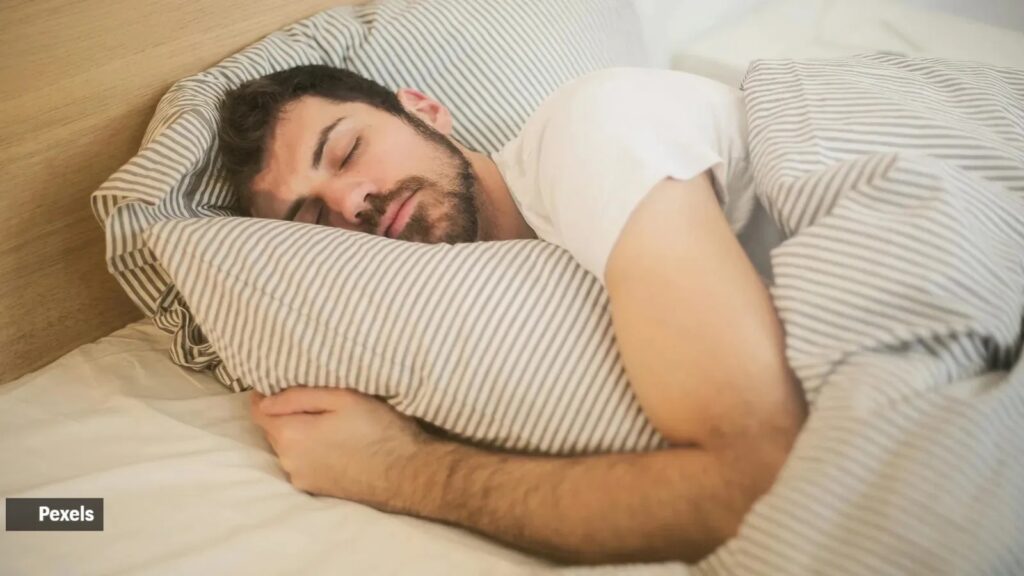970x125
Many of us face unexplained sleep issues. Instead of relying on melatonin pills to improve sleep quality, sports physiotherapist Dr Sudhanshu Rai, who works at BCCI Centre of Excellence Camps, suggested a few measures that can help.
970x125
“Here’s what’s happening: our sleep is controlled by melatonin and cortisol — both of which are highly sensitive to light, food timing, temperature, and stress. Constant screen exposure, late caffeine, and eating heavy dinners confuse your circadian rhythm, leading to delayed sleep or poor quality rest,” said Dr Rai in a post on Instagram.
He suggested following a 7-day protocol:
Stop coffee after 12 pm– Caffeine has a half-life of 5–6 hours. “Even your 3 pm coffee can still disrupt melatonin production by bedtime,” said Dr Rai.
No screen time after 8:30 pm – Blue light from phones suppresses melatonin release. Shutting screens early helps your brain shift into rest mode naturally.
1 banana + 1 tsp ghee at night – Bananas are rich in magnesium and tryptophan (a precursor to melatonin and serotonin), and ghee helps stabilise blood sugar — preventing night-time cortisol spikes that wake you up.
Viparita Karani (legs up the wall) – This pose activates the parasympathetic nervous system, slows heart rate, and calms the mind. Clinical trials have shown it improves sleep latency and quality.
White noise/ocean sounds – Studies show ambient natural sounds reduce sleep disturbances by masking environmental noise and reducing sympathetic arousal.
Story continues below this ad
Room temperature <24°C – Cooler environments help your body drop core temperature — a natural trigger for melatonin release and deep sleep.
Dinner by 7:30 pm – Late eating disrupts insulin and melatonin timing. Early dinners align better with your circadian biology and improve both sleep onset and depth.
 Ensure you avoid screens before bed (Photo: Freepik)
Ensure you avoid screens before bed (Photo: Freepik)
Sleep isn’t just about being tired — it affects memory, fat loss, immunity, and mood. “Fix the inputs. Your body already knows how to sleep — just give it the right conditions,” said Dr Rai, adding that if it helps, repeat for six weeks. You are not insomniac. You are overstimulated.
Dr Manjusha Agarwal, senior consultant, internal medicine, Gleneagles Hospital, Parel, Mumbai, concurred that good sleep doesn’t always need pills; it needs a dedicated sleep routine.
Story continues below this ad
“For 7 days, follow these simple steps and then keep repeating them for another 6 weeks to train your body clock. Go to bed and wake up at the same time daily, even on weekends. No binge-watching at night. Avoid caffeine, heavy meals, and screen time at least two hours before sleeping,” said Dr Agarwal.
Spend 15–20 minutes in relaxing activities like reading, listening to soft music, or deep breathing before bed. Keep your bedroom cool, dark, and quiet.
Dr Agarwal also advocated for morning sunlight and light exercise during the day to help establish your sleep rhythm.
“If you wake up at night, don’t reach for your phone; instead, do slow breathing until you feel sleepy again,” said Dr. Agarwal.
These habits, when done consistently, signal your body to rest naturally, helping you sleep deeply and wake up refreshed. It is the need of the hour to regulate your sleep habits and improve your overall well-being. Make sure to get at least 7-8 hours of sleep per day, and you will surely feel better.
Story continues below this ad
DISCLAIMER: This article is based on information from the public domain and/or the experts we spoke to. Always consult your health practitioner before starting any routine.
970x125

